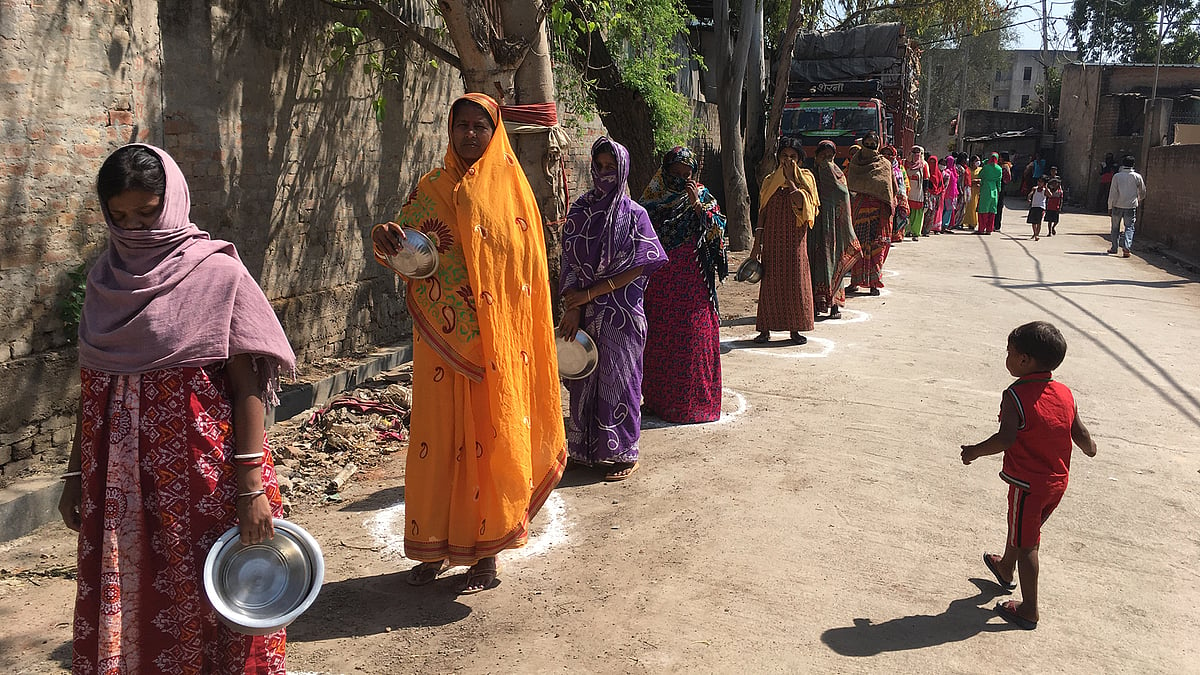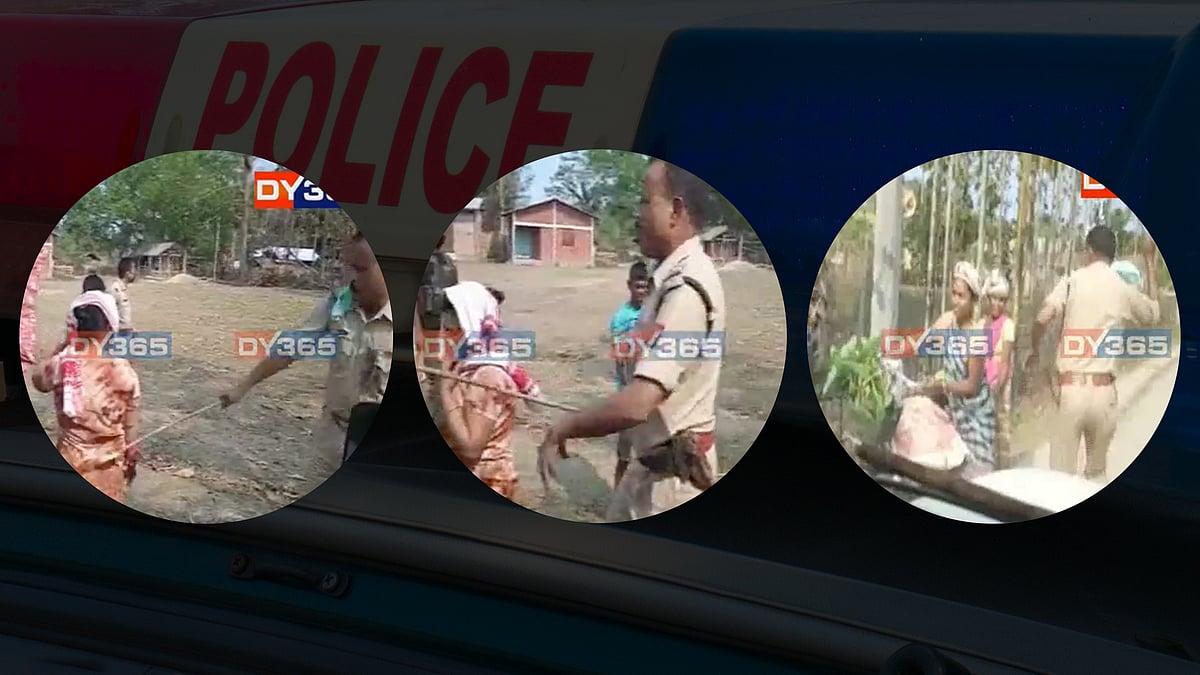Assam activists blow whistle on rice scam amid coronavirus lockdown, police arrest them
While the police maintain that the arrest is related to a pending case, the activists and local residents allege that it’s intended to cover up corruption.
A public distribution system scam and the consequent arrest of two activists has rocked eastern Assam’s Golaghat district amid the countrywide coronavirus lockdown.
The activists, Soneswar Narah and Pranab Doley, had filed a first information report regarding the scam on April 6. At around 2.30 pm the next day, both were arrested. While police maintained that the arrest was related to an earlier case, the activists and locals alleged vendetta behind the move.
As India completed two weeks of the lockdown, allegations emerged that nearly 900 quintals of rice had gone missing from a cooperative society in the Kaziranga area. Once the anomalies came to light, Vivek Shyam, the sub divisional officer of Bokakhat, instituted a magisterial inquiry. Later, the administration, based on the investigation, lodged a case against the cooperative society’s secretary and storekeeper at the Kohora police outpost.
With at least one more week of lockdown to go, the alleged siphoning off of the rice left hundreds of poor families without rations. Narah and Doley, on behalf of Jeepal Krishak Shramik Sangha, a local peasant rights organisation, decided to pursue the issue further.
On April 6, they filed an FIR at the Bokakhat police station. They also submitted a memorandum to the state’s chief minister through the deputy commissioner of the district. The organisation argued that the scam could not be the handiwork of a couple of individuals and demanded that the inquiry be widened to cover other officials of the food and civil supplies department in Golaghat district.
“We cannot underestimate the enormity of people losing their daily meal in the time of this calamity which has killed many people. We are deeply saddened to inform you that there are reports of people not receiving their due rice in almost all the cooperative society areas of Golaghat district. We demand that the scams related to PDS should be investigated in a transparent manner with swift action against the persons involved,” read a translated extract from the memorandum.
On April 7, the activists were called to the Bokakhat police station to give their statements on the complaint. Narah and Doley were accompanied by three others. Prithviraj Rajkhowa, the sub divisional police officer of Bokakhat, led the conversations. According to one of the three accomplices, Rajkhowa talked to them individually about the rice scam.
“We were called one after another and asked about the status of rice availability in our village. Then, they called Narah and Doley together and talked for almost 45 minutes. As we waited outside, the police suddenly came out and informed us that the duo had been arrested,” the accomplice said on the condition of anonymity. “They were duped.”
The police officials did not respond to any query and took the two activists to a nearby hospital for a medical check-up, he added. “We kept asking about the charges against them but the police ignored us. Narah and Doley were later produced before the sub-divisional judicial magistrate in Bokakhat,” he said. The magistrate ordered they be put in judicial custody in Golaghat town.
The case against the activists
The action against the duo came on the basis of a case registered in June 2018 at the Bokakhat police station. Speaking to Newslaundry, Dibyajyoti Dutta, the officer in charge, said it was related to a road accident near Bokakhat.
A young boy had died after being hit by a truck owned by a local businessman. “At the time, Narah and Doley organised a protest and obstructed government officials from doing their duty. Accordingly, Section 353 [of the Indian Penal Code] was slapped against them in addition to a few others,” Dutta said. The charges were also levelled against a number of unnamed individuals besides Narah and Doley, he added.
The other sections applied against the activists were 109, 188 and 34 of the IPC.
But according to Durno Patgiri, a member of the organisation where Doley serves as the secretary and Narah as the adviser, the police action was retaliation for them blowing the whistle on the rice scam.
“If the case was from 2018, why was no action taken all this while?” Patgiri asked. According to him, now that their organisation demanded an inquiry into the PDS scam, some corrupt officers must have got alert. “It is likely that they nudged the police for acting against our leaders to save their own chairs.”
Narah and Doley echoed this view following their arrest. They termed the 2018 case as “bogus”.
In a video which shows the duo being escorted by the police to the hospital, Narah says, “The police called us to the station to take statements on our case against the rice scam. Instead, they arrested us on the basis of a bogus case.” Doley repeats this.
But officer Dutta rejected the allegations. When asked why the activists were being arrested now, nearly two years after the case was filed, he said: “All the details of the investigation are available in the case diary and will be produced before the court.”
Dutta refused to comment further.
Narah, known for fighting against corruption and excesses of the government, was already on the police’s radar. On April 4, he was summoned by the Bokakhat police and interrogated regarding his Facebook posts about the government’s actions to contain Covid-19 in Golaghat.
A few of the posts that took potshots at the government also criticised police brutality and brought attention to the hardships of migrant workers during the lockdown.
Narah also wrote and shared posts from other people about the communalisation of the crisis following the Tablighi Jamaat episode. On April 3, in the context of the quarantine arrangement at a government hospital in Golaghat, where Muslim patients allegedly spat on people, Narah wrote: “Is it enough to just put up a signboard proclaiming 'quarantine'? The 'spitting' incident has been hyped to cover up for lapses in the system. I hereby challenge: what is the WHO definition of quarantine?"
According to a report in the local press, the police asked Narah to delete the posts and not publish write-ups like this in the future.
“You have a significant following in Assam as an activist. So, do not write critical posts on social media about the government's management of the coronavirus situation,” an officer allegedly warned him. When asked which specific post caused concern, the officer replied that he was simply following orders from “above” and had not read anything personally.
Narah, expectedly, refused to oblige and continued to question the government’s mismanagement.
The rice scam provided an opportunity to the government to act against him, alleged an aide without willing to be named.
“As the FIR filed by Jeepal riled certain officials, an old case was invoked to punish them [Narah and Doley]. This clearly proves that the rot actually runs deeper in the administration,” he said. “The buck doesn’t stop with the secretary and storekeeper of the [cooperative] society.”
The shortage of rice
Residents of the Bokakhat area have been facing a shortage of subsidised rice for more than a week now. According to a resident of Agoratoli village, the last time they could procure rice at a fair price was around March 12. Since the lockdown started and their stocks dwindled, they struggled to meet the required amount.
“For several days now, the fair price shop in our village has failed to give us rice due to lack of supply. The situation is the same in nearby villages like Amtenga and Dubahati,” the resident said.
The Kaziranga cooperative society serves more than 20 villages with government-subsidised rations like rice, sugar and salt, among others. The villages are composed of mixed communities like Assamese Hindus, Nepalis, Mising tribals, and Adivasi tea garden workers. A large number of them are small-time farmers and daily wage labourers.
According to a beneficiary, each name on a ration card is granted a quota of four kilograms of rice per month at Rs 1 a kilo. The cardholders buy the rations from designated shops in villages that procure the supply from a cooperative society like the one in Kaziranga.
“Around 1,200 quintals of rice are required every month in the area covered by the Kaziranga cooperative society. But, as it has been discovered, only a little more than 300 quintals are stocked currently. The remaining large chunk has been siphoned off by the officials,” said the Agoratoli resident.
Rice is a staple diet for most in Assam and other Northeastern states. For a person of low income, a subsided availability of the grain is often enough to run the kitchen. Green leafy vegetables and firewood are easily available in the countryside. There is also an abundance of water bodies which make fish an easy find across villages. These, combined with rice, make for wholesome diets for the working class on a daily basis. But faced with a lockdown, the scarcity has brought troubles.
Because of the shortage, the villagers were resorting to borrowing rice from other families. “Thankfully, a few families in every village grow their own paddy. So, others are now relying on them for rice,” said another resident of Agoratoli. There was no other option as all markets were shut, he added. “If the lockdown stretches, the situation will worsen.”
As of now, the accused secretary and the storekeeper of the cooperative society are on the run. The police said efforts were underway to nab them.
On April 8, Narah and Doley approached the sub divisional judicial magistrate’s court in Bokakhat with a bail plea. The court rejected the petition and extended their judicial custody till April 18.
“Our main argument was the sudden and suspicious nature of police action after two years of inactivity. We tried to argue this was a retaliation for complaining about the rice scam,” said Narayan Upadhyay, the lawyer who represented them.
Upadhyay told Newslaundry that they would now approach the sessions court in Golaghat for bail on Thursday.
 ‘Will a disease kill us, or will hunger get to us first?’ : Scenes of severe hunger and distress in Delhi
‘Will a disease kill us, or will hunger get to us first?’ : Scenes of severe hunger and distress in Delhi Lockdown brutality continues: Policeman assaults Adivasi women in Assam
Lockdown brutality continues: Policeman assaults Adivasi women in Assam
